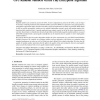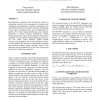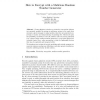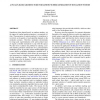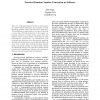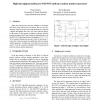130
click to vote
EGH
2010
Springer
15 years 1 days ago
2010
Springer
Random numbers are extensively used on the GPU. As more computation is ported to the GPU, it can no longer be treated as rendering hardware alone. Random number generators (RNG) a...
RSA
2008
15 years 1 months ago
2008
We study the cutoff phenomenon for generalized riffle shuffles where, at each step, the deck of cards is cut into a random number of packs of multinomial sizes which are then riffl...
107
click to vote
WSC
2001
15 years 3 months ago
2001
The requirements, design principles, and statistical testing approaches of uniform random number generators for simulation are briefly surveyed. An objectoriented random number pa...
123
click to vote
ERSA
2006
15 years 3 months ago
2006
Reconfigurable computing offers an attractive solution to accelerating infrared scene simulations. In infrared scene simulations, the modeling of a number of atmospheric and optic...
FSE
2008
Springer
15 years 3 months ago
2008
Springer
Chosen-plaintext attacks on private-key encryption schemes are currently modeled by giving an adversary access to an oracle that encrypts a given message m using random coins that ...
115
click to vote
WSC
2008
15 years 4 months ago
2008
Simulations often depend heavily on random numbers, yet the impact of random number generators is recognized seldom. The generation of random numbers for simulations is not trivia...
123
click to vote
FCCM
2006
IEEE
15 years 5 months ago
2006
IEEE
This paper presents a technique for efficiently generating random numbers from a given probability distribution. This is achieved by using a generic hardware architecture, which t...
144
click to vote
FCCM
2003
IEEE
15 years 7 months ago
2003
IEEE
Two FPGA based implementations of random number generators intended for embedded cryptographic applications are presented. The first is a true random number generator (TRNG) whic...
118
click to vote
ACSAC
2003
IEEE
15 years 7 months ago
2003
IEEE
There is a large gap between the theory and practice for random number generation. For example, on most operating systems, using /dev/random to generate a 256-bit AES key is highl...
125
click to vote
PDCAT
2007
Springer
15 years 8 months ago
2007
Springer
ct There have been many previous attempts to accelerate MT19937 using FPGAs but we believe that we can substantially improve the previous implementations to develop a higher throug...
